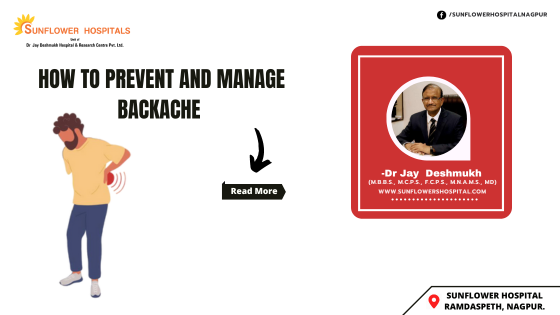Why are the symptoms of backaches increased in the general population?
Lack of physical activity, improper posture, and abdominal obesity are important causes. We need to spend extra time exercising our back to prevent stiffness and maintain flexibility. As the age advances, symptoms of low backache become more common. Hence, exercising the back becomes more relevant.
What are the conditions commonly linked to backache?
Muscle or ligament strain due to repeated heavy lifting or a sudden awkward movement can strain the back. People with poor physical condition or those with constant back strain can have painful muscle spasms. Bulging or ruptured cushions in between the vertebrae can press on the nerves and can cause severe pain. Arthritis of the spine can cause narrowing of the space around the nerves that come out from the spinal cord, a condition known as spinal stenosis. The vertebrae may have painful breaks due to brittleness. This is known as osteoporosis.
What are the risk factors for backache?
Anyone can have backache, including children and young adults. Weak unused muscles of the ab• domes and back can cause backaches. Lack of exercise and excess body weight can cause backaches. Arthritis of the spine or cancers of the spine can cause backaches. Improper lifting of weights, people prone to stress, anxiety, and depression have more incidence of backache. Excess coughing due to smoking can put a strain on the back. Smoking also reduces blood supply to the vertebrae, causing OS• osteoporosis.
When to see a doctor in case of backache?
If the pain causes numbness or weakness of the legs, lasts longer than a few weeks, pain that does not improve with rest, and backache that is associated with weight loss necessitates early medical attention. Backache associated with loss of control over urination or defecation is a serious symptom and needs urgent medical attention-Every third person above 40 years suffers from backache. This occurs because of excess wear and tear of the spine, which has 33 vertebrae. It is important to care for your back to prevent backaches, which can cause disability and chronic pain.
What are the important investigations?
A detailed clinical assessment helps to diagnose most of the conditions related to backache. However, to confirm the diagnosis and to assess in case of poor response to therapy X-rays of the spine, MRI or CT scans of the spine, blood tests and
nerve studies are performed.
What are the medications generally recommended?
Painkillers like Ibuprofen or Nap• oxen are used sparingly to prevent side effects. Muscle relaxation medications, locally applied pain relievers, and antidepressants are commonly used. Local cortisone injections, and nerve stimulators are other forms of treatment.
What about exercises?
Being correctly active is the main therapy. Shedding excess fat from the abdomen, back extension exercises, stretching exercises, and improving the body’s core muscle strength are certainly important components of exercises. Guidance from the doctor and physiotherapist is important.
Is there a role for vitamin D and Calcium?
This may help to treat and prevent osteoporosis, and can certainly help in cases of deficiency. Elderly men above 60 years and all women after menopause should receive these supplements.
Can sitting at a place for long hours cause backache?
Certainly, it does. Software engineers, students studying for long hours, and other professionals sitting for long are susceptible to backache and need to change their lifestyles. Backache can certainly be prevented and treated by proper exercises and changes in lifestyle. Start your back exercises early enough and change your lifestyle to prevent and treat backache.
Author: Dr Jay Deshmukh
Dr Jay Deshmukh is Chief Physician and Director, Sunflower Hospital, Nagpur Honorary Physician to Honorable Governor of Maharashtra and PondicherryCentral. Dr Jay Deshmukh is an M.B.B.S., M.C.P.S., F.C.P.S., M.N.A.M.S., MD From Internal Medicine – Bombay and New Delhi.


